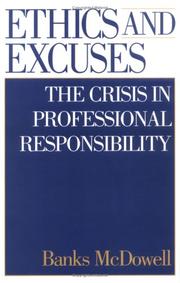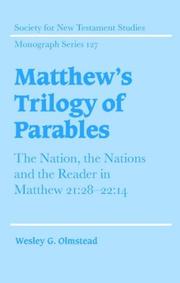| Listing 1 - 5 of 5 |
Sort by
|

ISBN: 1567203868 9786610872459 1280872454 031300045X 0585384231 9780585384238 9780313000454 9798400647550 Year: 2000 Publisher: Westport, Conn. Quorum Books
Abstract | Keywords | Export | Availability | Bookmark
 Loading...
Loading...Choose an application
- Reference Manager
- EndNote
- RefWorks (Direct export to RefWorks)
Examines the excuses professionals make when accused of acting unethically, and asks when they are valid and when not. This study of excuses aims to provide a challenging way to think about the nature of ethical problems in the professions and to suggest ways of solving them.
Ethics-- United States. --- Ethics --- Responsibility --- Excuses --- Philosophy --- Philosophy & Religion --- Excuses. --- Accountability --- Moral responsibility --- Obligation --- Etiquette --- Manners and customs --- Supererogation
Book
ISBN: 901409194X Year: 2002 Publisher: Alphen aan den Rijn Kluwer
Abstract | Keywords | Export | Availability | Bookmark
 Loading...
Loading...Choose an application
- Reference Manager
- EndNote
- RefWorks (Direct export to RefWorks)
Dit boekje leert u op een goede manier omgaan met fouten. U bent tenslotte maar een mens en fouten maken is menselijk. Belangrijk is dat u de verantwoordelijkheid durft te nemen. Dat u de fout niet wegmoffelt, maar oprecht excuses aanbiedt, actief zoekt naar een oplossing en nagaat wat u ervan kunt leren. Hier leert u stapsgewijs hoe u dat het beste kunst aanpakken. Ook de leidinggevende speelt in dit proces een belangrijke rol. Wie zijn medewerkers straft voor gemaakte fouten, bereikt alleen dat zij hun fouten angstvallig voor hem verboreen houden. Als ze in plaats daarvan wel voor hun fouten durven uitkomen, geeft u hen de kans om te ontwikkelen en de dingen te verbeteren. U kunt hen daarbij helpen door hen te stimuleren zelf een oplossing te vinden en na te gaan hoe herhaling valt te voorkomen. En dat zal ook de organisatie ten goede komen.
Fouten. --- Interne communicatie --- Ondernemingen. --- Mass communications --- Personeelsbeleid --- Falen --- 65.011 --- 165.212 communicatie --- 061 organisaties --- 334 bedrijven --- 643 Taalzorg --- #KVHA:Communicatie; Nederlands --- communicatie --- fouten --- excuseren --- *843 --- Excuses --- Fouten --- Klachten --- Personeelsmanagement --- 65.011 General principles. Efficiency. Rationalization. Productivity --- General principles. Efficiency. Rationalization. Productivity --- Communicatieve vaardigheden --- Communicatie --- Leren
Book
Year: 2021 Publisher: Basel, Switzerland MDPI - Multidisciplinary Digital Publishing Institute
Abstract | Keywords | Export | Availability | Bookmark
 Loading...
Loading...Choose an application
- Reference Manager
- EndNote
- RefWorks (Direct export to RefWorks)
The impetus behind this Special Issue emerged from a quest to move beyondbinary thinking in the contemporary period about people who sell sexual services,including recent disputes about “sex trafficking vs. prostitution” and“criminalization vs. decriminalization”, to encourage theoretical and empiricalscholarship by exploring how sex work actually operates under different regulatoryregimes. The volume includes contributions from scholars of different socialsciences backgrounds based in five countries– New Zealand, the United Kingdom,Brazil, the United States and Canada. The article topics range widely,and both quantitative and qualitative research methods are showcased. The empiricalevidence presented adds to our current understanding of the complexityof this phenomenon of sex commerce/prostitution, which is found to be largelya problem of social inequality within and across capitalist societies. The authorscall for policies to address occupational and societal wide inequities faced by sexworkers across many countries.
decriminalisation --- employment --- human rights --- sex work --- exploitation --- money --- agency --- self-care --- gender --- transgender --- subjectivity --- end demand --- violence --- police --- criminalization --- indoor sex work --- stigma --- Canada --- technology --- mental health --- job attributes --- job insecurity --- service work --- hairstyling --- governmentality --- adolescents --- anthropology --- state --- excuses --- Amazon --- consent --- chemsex --- MSW --- men who have sex with men --- MSM --- qualitative --- Grounded Theory --- labour --- vulnerability --- objectification --- feminism --- sociology of labor --- Rio de Janeiro --- New Orleans --- n/a

ISBN: 0521831547 0521036305 1107139147 0511180470 0511063040 0511307381 0511488122 1280421800 0511204558 0511071507 9780521831543 9780511063046 9780511488122 9780521036306 Year: 2003 Volume: 127 Publisher: Cambridge Cambridge University press
Abstract | Keywords | Export | Availability | Bookmark
 Loading...
Loading...Choose an application
- Reference Manager
- EndNote
- RefWorks (Direct export to RefWorks)
Wesley Olmstead examines the parables of the Two Sons, the Tenants and the Wedding Feast against the backdrop of the wider Matthean narrative. He explores Matthew's characterization of the Jewish leaders, the people and the nations, and assesses the respective roles of Israel and the nations in the plot of Matthew's Gospel. Against the current of contemporary Matthean scholarship, Olmstead argues both that the judgement this trilogy announces falls upon Israel (and not only her leaders) and that these parables point to the future inclusion of the nations in the nation that God had promised to raise up from Abraham. Bringing both literary-critical and redaction-critical tools to bear on the texts at hand, Olmstead not only elucidates the intended meanings of this parabolic trilogy but also attempts to determine the responses they elicited from their first readers. Transcending Matthean scholarship, this book has implications for all Gospel studies.
Two sons (Parable) --- Wicked husbandmen (Parable) --- Great supper (Parable) --- Jews in the New Testament --- Bible --- Criticism, interpretation, etc --- Bruiloftsmaal (Parabel) --- Feast [Parable of ] --- Festin des noces (Parabole) --- Gentiles in the New Testament --- Gentils dans le Nouveau Testament --- Great Feast (Parable) --- Guest who made excuses (Parable) --- Heidenen in het Nieuwe Testament --- Invités discourtois [Parabole des ] --- Joden in het Nieuwe Testament --- Juifs dans le Nouveau Testament --- King's son [Marriage of ] (Parable) --- Marriage of the king's son (Parable) --- Noces [Festin des ] (Parabole) --- Onwillige genodigden (Parabel) --- Supper [Parable of ] --- Unwilling guests (Parable) --- Wedding feast (Parable) --- Wedding garment (Parable) --- Bible NT. Gospels. Matthew --- 225*33 --- 226.2 --- 225*33 Parabels. Gelijkenissen --- Parabels. Gelijkenissen --- Husbandmen, Wicked (Parable) --- Wicked tenants (Parable) --- Wicked vinedressers (Parable) --- Feast, Parable of --- Great feast (Parable) --- Guests who made excuses (Parable) --- King's son, Marriage of (Parable) --- Supper, Parable of --- Evangelie volgens Matteüs --- Bible. --- Criticism, interpretation, etc. --- Bible. N.T. Matthew XXI,28-XXII,14 --- Arts and Humanities --- Religion --- Gentiles in the New Testament. --- Jews in the New Testament.
Book
ISBN: 3030493520 3030493512 Year: 2021 Publisher: Cham, Switzerland : Palgrave Macmillan,
Abstract | Keywords | Export | Availability | Bookmark
 Loading...
Loading...Choose an application
- Reference Manager
- EndNote
- RefWorks (Direct export to RefWorks)
Ethnology --- Gimi (Papua New Guinean people) --- Social conditions. --- Papua New Guinea --- Social life and customs. --- Gimi (Papua New Guinea people) --- Loko (Papua New Guinean people) --- Papuans --- Ètnies d'Oceania --- Dones aborígens --- Patriarcat --- Ritus i cerimònies --- Relacions home-dona --- Usos i costums --- Etnografia --- Papua Nova Guinea --- Dones i homes --- Homes i dones --- Relacions de gènere --- Relacions dona-home --- Relacions homes-dones --- Estudis de gènere --- Relacions humanes --- Diferències entre sexes (Psicologia) --- Gènere --- Relacions amoroses --- Celebracions religioses --- Cerimònies --- Baptisme --- Cerimònies de graduació --- Confirmació --- Exorcisme --- Fetitxisme --- Inauguracions --- Processons --- Processons religioses --- Ritus d'iniciació --- Ritus de purificació --- Sagraments --- Canonització --- Misteris religiosos --- Antropologia --- Antropologia cultural --- Antropologia social --- Costums socials --- Tradicions --- Vida de societat --- Vida social i costums --- Civilització --- Patrimoni cultural --- Brindis --- Castes --- Comunitats --- Conducta sexual --- Cort i cortesans --- Desenvolupament social --- Dies festius --- Donacions --- Esbarjo --- Estils de vida --- Etiqueta a la taula --- Excuses --- Festes --- Festivals --- Fires --- Folklore --- Hàbits alimentaris --- Indumentària --- Juraments --- Ordalia --- Precedència de rang --- Roba de vestir --- Petons --- Regals --- Ritus i cerimònies fúnebres --- Salons literaris --- Tatuatges --- Torneigs medievals --- Vacances --- Vida a l'aire lliure --- Vida bohèmia --- Vida nocturna --- Vida rural --- Etiqueta --- Androcràcia --- Família patriarcal --- Societat patriarcal --- Pares --- Estructura social --- Família --- Homes --- Parentiu patrilineal --- Dones indígenes --- Dones nadiues --- Aborígens --- Dones --- Etnologia (Oceania) --- Etnologia d'Oceania --- Grups ètnics --- Arunta (Poble australià) --- Warlpiri (Poble australià) --- Papua-Neuguinea --- Papua Niugini --- Papua Nuova Guinea --- Melanèsia --- Nova Guinea (Illa) --- Illes Salomó --- Trobriand (Papua Nova Guinea : Arxipèl·lag) --- Pobles indígenes
| Listing 1 - 5 of 5 |
Sort by
|

 Search
Search Feedback
Feedback About UniCat
About UniCat  Help
Help News
News